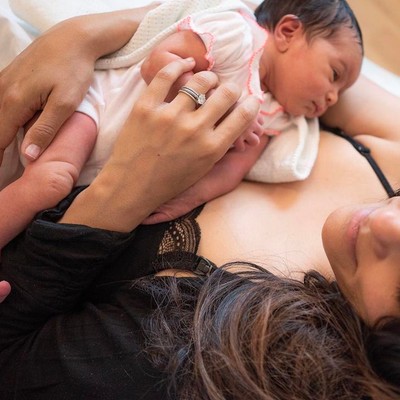
What It Means To Experience Pre- & Post-Natal Depression
My route to motherhood wasn’t exactly straightforward. Having children was always at the top of my list but my husband and I decided to wait until we had the big house and all the boxes ticked. It ended up being a long and arduous wait – during which I suffered a miscarriage – but miraculously, a month before starting IVF, I fell pregnant naturally.
At the time, I didn’t realise the impact my work and lifestyle were having on my mental state. Only now do I realise I had pre-natal anxiety long before giving birth. I was so happy to be pregnant, but so scared something would go wrong. For the first 12 weeks I had a lot of morning sickness, although weekly acupuncture sessions helped combat the nausea. But I also had extreme back pain that showed itself during my last trimester – something I put down to pregnancy, but actually ended up being an undiagnosed slipped disc. As a result, I opted for an elective C-section to give birth to our daughter Genevieve.
Even though the C-Section was the safest choice, it did affect my mental health. You don’t get that rush of oxytocin (natural high) like when you go through natural labour, so it can be a very clinical and cold experience. Your milk doesn’t always come in naturally, either. It’s important to listen to your doctor if it’s the safer route for you and the baby, but I wish I had known how to prepare my mind and body beforehand.
Those early days with a newborn were a rollercoaster. One minute I was full of joy and the next filled with fear. I let my concerns and worries consume me and didn’t let myself enjoy having a baby. Then, due to my C-section and further health complications in the weeks following the birth, I ended up separated from Genevieve after for further tests and to have an operation on my back. It was a real turning point – I felt like less of a mother because I couldn’t breastfeed her and instead of being able to move past it, I fixated on my failings. The negativity started to feel all-consuming.
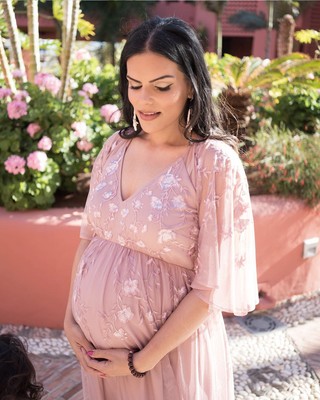
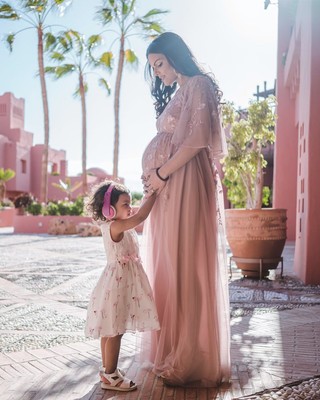
As a career woman, I needed to be the best at motherhood. Thankfully, lying in hospital after back surgery, my gut sense kicked in and I was able to pull myself out of this dark hole I’d pushed myself into. There’s always a turning point or moment when you sink or swim, and it made me realise that postnatal depression is such a spectrum of emotions – one that goes from mild baby blues right through to post-natal psychosis. I was lucky to have the right support around me and the tools to get through it, but other women might not. It was a big motivator for me to get out there and raise awareness of these issues in the future.
Another blow was learning my job hadn’t been kept open for me. It was a huge change going from a lively entertainer on national radio to a full-time stay-at-home mum. Over time, I came to see it as a bit of a blessing, as I didn’t want to miss anything with Genevieve after my hospital stay. Today, I’m lucky to have so much help – my mum takes the girls if any presenting work comes in and thanks to lockdown, I’ve been able to be really present with them.
That said, not everyone is as lucky. It has gotten better – for instance, there are now six-week checks for pregnant women to talk about their mental health with their GP and a lot of the stigma has been broken down. Still, as women, we need and deserve more – we need safe spaces to say I’m not okay and know that our baby won’t be taken away from us as a result. It’s what stops so many women from speaking up – the consequences of admitting you’re not in a good place mentally can be really scary.
Today, I feel I can handle anything. My own challenges have really shaped me and it’s goes a long way in explaining why I had zero fear when it came to my second pregnancy. This time, I had the tools to navigate all the signs and listen to my body. Vivienne, my second daughter, was a much calmer baby and I believe lower anxiety levels had a lot to do with it. I’m one of the lucky ones, but I also did the work to ensure I had a better experience second time round. Yoga, acupuncture, meditation – it took real commitment to work on myself and my mental health, but I was determined to do it.
I’d also made a promise to do more charity work after Genevieve was born. I knew I needed to use my platform to help other mums out there and work hard to break down the stigma around maternal mental health. Eight months after giving birth and a few months after my back surgery, I started working on the Heads Together campaign set up by Prince William, Prince Harry and the Duchess of Cambridge. I also made a film for them which led to a meeting with the Duchess at Kensington Palace to discuss our experiences of motherhood. It marked the beginning of my journey to becoming an active campaigner for mothers’ rights and maternal mental health. I’ve also been an ambassador for the Prince’s Trust for many years and I’m an ambassador for Tiny Happy People, too – an early learning platform the Duchess is also involved with.
In the future I’d love to make a documentary about mums and their experiences. I want there to be more conversations about mental health in pregnancy and for women to be far more prepared. At the moment, there’s such a lack of awareness about the early stages of pre-natal anxiety and depression – especially the red flags to look out for – and not enough professional help available early on. Yes, there is a line between causing unnecessary fear and being prepared, but I believe mothers should be made aware of the emotional journey they’re about to embark on.
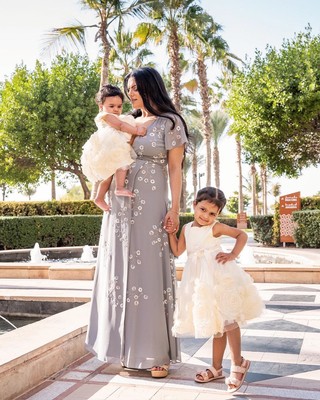
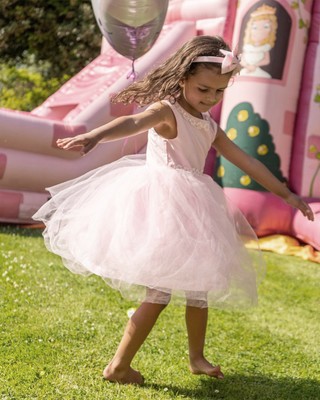
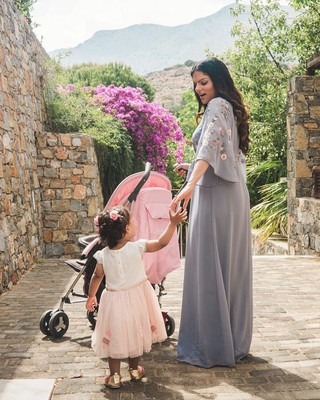
I wish I’d known motherhood was such a journey. I also wish we had tried for a baby on our honeymoon when we were most relaxed! Trust your instincts as to when you feel it’s the right time but know there’s never a ‘perfect’ time to have a family. Also, make the most of your sleep because it will be forever disturbed from the night they’re born. The first few weeks and months are a lot harder than you’re led to believe – you need to have as much support in place as possible. Finally, know that not breastfeeding your baby isn’t the end of the world – doing so can help your mental state and create a certain bond, but if you simply can’t, it’s okay. You’re still a good mum.
It’s fine to feel overwhelmed. Ask for help and support – it makes you an even better mother then the one you are so desperately striving to be. Be aware of any signs and symptoms of post-natal anxiety and depression, too, and keep your partner in the loop at all times. They’re not going to judge you; they just want to help in any way they can. Remember, finding your groove as a new mother takes time, so don’t try to rush it or make it perfect.
It’s a cliché but becoming a parent completed me. It’s brought me a depth of understanding and a strength I never imagined possible. I now know I can push myself through any problem or challenge and that I can also perform on just a few hours’ sleep! It’s also made me kinder, more patient and taught me the meaning of unconditional love. It’s a feeling like no other, and I’m all the better for it.
Follow @NeevSpencer on Instagram and visit HeadsTogether.org
DISCLAIMER: We endeavour to always credit the correct original source of every image we use. If you think a credit may be incorrect, please contact us at info@sheerluxe.com.


